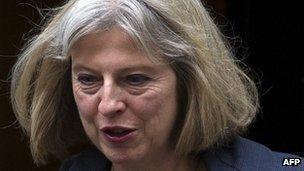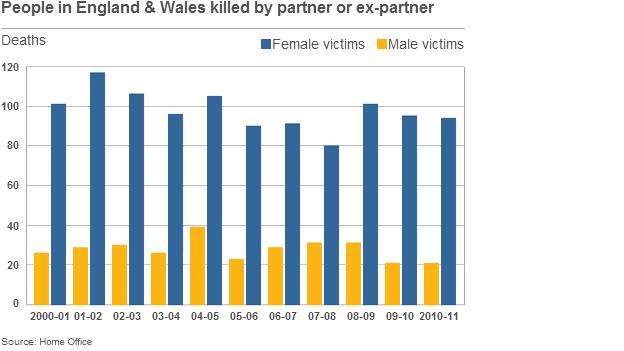Theresa May to demand police improve domestic violence handling
- Published

Domestic violence is considered "a norm" by too many men and some women, Theresa May said
The home secretary has said she will speak to Parliament soon about how police in England and Wales can improve the way they handle domestic violence.
Theresa May has been in talks with Her Majesty's Inspectorate of Constabulary (HMIC), which assesses the police, about possible improvements.
In a BBC interview, she said there were still too many women being abused.
Mrs May also said too many young men - and even some young women - thought violence in a relationship was normal.
She told BBC Radio 4's The World at One she had been talking to HMIC "about them looking into this whole question of police response".
"I would intend to be making a formal announcement on this to Parliament fairly soon," she said.
Theresa May spoke to BBC Radio 4's the World at One
"But I think there are a number of agencies that we need to bring in in relation to this and certainly we would be looking as well to the College of Policing in terms of the sort of training and the sort of standards that are developed."
Speaking to The World at One she rejected the idea of a public inquiry, saying that would take too long.
About two women a week die from domestic violence in England and Wales, a rate which has remained fairly steady for more than a decade.
Last year, police used "community resolutions" - where the offender must apologise to the victim but is not prosecuted - in 2,488 domestic violence cases.
The Association of Chief Police Officers says such resolutions should only be used for low-level crime.
Labour shadow home secretary Yvette Cooper called them a completely inappropriate way to deal with domestic violence.
In the interview, Mrs May also said public attitudes must change if the issue was to be tackled.
"There are still too many cases - too many women up and down the country who suffer from domestic abuse," she said.
"Too many young men, and in some surveys it shows young women as well, think that some form of abuse or violence within a relationship is a norm - part of a relationship."
'My Hannah, I don't want people to forget who she was and what she went through'
There are also concerns that the quality of the police's response to domestic violence varies dramatically from force to force - and Ms Cooper called for Mrs May to set national standards.
Polly Neate, of the charity Women's Aid, said all UK children should have "high-quality" education about sex and relationships to help counter attitudes that foster domestic violence.
She also called for more police officer training, but warned that 30% funding cuts to support services last year meant police were limited in the kind of support they could provide.
Sandra Horley, of the domestic violence charity Refuge, is calling for an independent public inquiry to look at how the Crown Prosecution Service, social services and health services, as well as the police, handle domestic violence cases.
She also warned that refuges were being "decimated" by local authority funding cuts.
"It is a national problem requiring a national solution - and funding on a national level to protect the services that make the difference between life and death," she said.

- Published29 August 2013
- Published31 July 2013
- Published19 September 2012
- Published13 April 2011